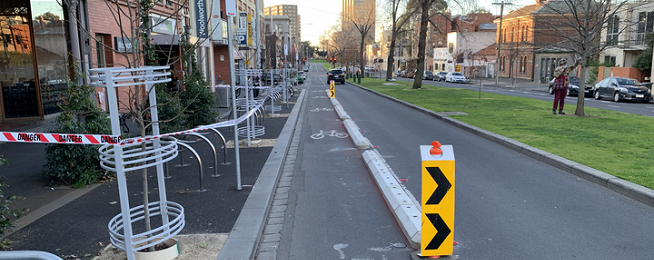The first 40 metres of what will be 40 kilometres of expanded bike infrastructure by the City of Melbourne hit the tarmac this week.
It might be just a few short strips of separation, but for riders it is a sweet taste of what is soon to come.
In two blocks, one in Faraday Street, Carlton, and the other around the corner in Drummond Street, we can see the first two samples of the new, easy-to-install separator barrier that will play an important role in the rapid roll-out of the upgrade bike lanes across the municipality.
And work is now starting on upgrades to Albert and Elgin Streets, and to Swanston Street north.
The barrier is made from a concrete composite that combines recycles glass—15 to 30 kilograms per barrier.
These installations do not require years of planning, huge machinery, services relocation, nor vast some of money.
The two initial installations should fix a couple of the most annoying hassles for riders through Carlton—cars parked in the bike lanes.
Both locations are in busy cafe strips where drivers somehow figured that pick-ups and drop-offs were most convenient if they used the bike lane.
Bikes, and there can be considerable numbers around here because of the proximity to the University, were constantly having to take their life into their hands by swerving around the illegal parkers into the traffic lane.
Lord Mayor Sally Capp said: "We're making it safer for essential workers living close to the CBD to ride to work, which will create more space on trams and trains for people who need to travel into the city from the outer suburbs.
"We're seeing people embrace riding and walking as a way to stay fit and maintain physical distance during the pandemic."
Transport portfolio Chair Cr Nicolas Frances Gilley said delivering a network of protected cycling lanes and lots of bike parking would benefit Melbourne's transport system and our environment.
"We're continuing to take climate action, even while responding to the COVID-19 pandemic. This project will kick-start changes to how people move around Melbourne for years to come.
"We're delivering priority routes to better connect suburbs like Carlton, East Melbourne, North Melbourne, Brunswick and West Melbourne to the central city," Cr Frances Gilley said.
The City estimates that the bike infrastructure project will support 17 jobs.
The new rapid deployment barriers are from Geelong firm Orca Civil.
Director of Orca Civil, Ken Williams, said the project supports local manufacturing and innovation.
"We worked with Deakin University for two years to develop the polymer concrete barriers made with recycled materials, so it's exciting to see the first bike lanes rolled out," Mr Williams said.
"We relocated our manufacturing from China to Geelong in 2016 so the bike lanes are being made by a company that's fully Australian owned and operated.”
The first five priority routes to be delivered in the coming months are:
Swanston Street (around the University of Melbourne from Grattan Street to Cemetery Road) Exhibition Street stage one (Flinders Street to Bourke Street) Rathdowne Street (Victoria Street to Faraday Street) William Street (Dudley Street to Flinders Street) Abbotsford Street (Flemington Road to Queensberry Street)
The adaptable bike lanes will be functional for years to come and may be progressively replaced with fixed lanes over time as required.
The project is being delivered in two stages in collaboration with the Victorian Government.
The City of Melbourne is investing $16 million to deliver the first 20 kilometres of fast-tracked bike lanes this year.
Pedalling to a Better Normal
Quick-build bike lanes have been a key part of the world's response to COVID-19 and are central to Bicycle Network's Pedalling to a Better Normal plan.
Melbourne has joined Sydney in installing new bike lanes that help people travel around town without having to get close to others on public transport or clog the roads with cars. Brisbane is investigating pop-up lanes as well.
Bicycle Network would also like to see footpath riding restrictions removed to create more space for people to ride near home without travelling to off-road trails.
Pedalling to a better normalBecome our friend
Find out more about Bicycle Network and support us in making it easier for people to ride bikes.


